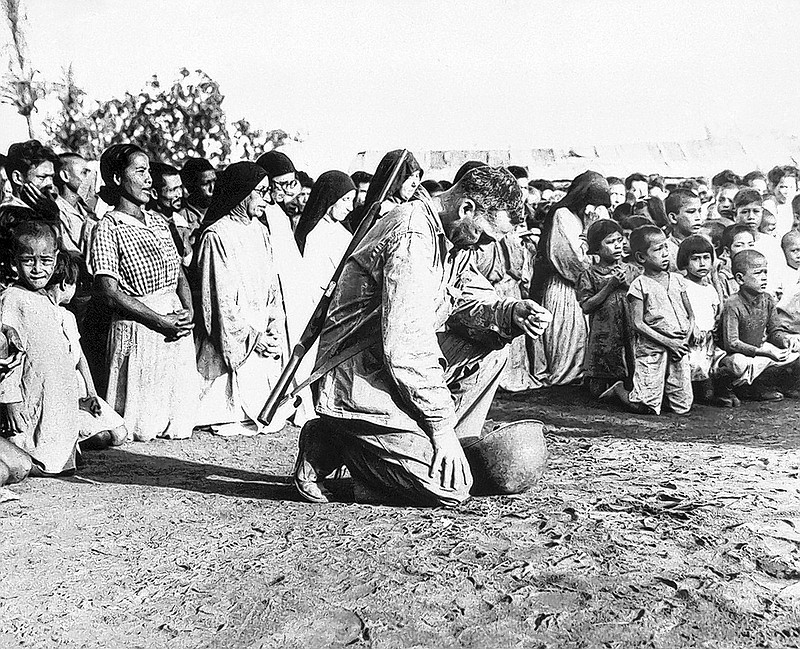The history of newspaper reporting in Chattanooga has included many talented journalists. None has been more influential and colorful than John Popham, who first served as a reporter for The New York Times and later as reporter and news editor of The Chattanooga Times from 1958 until his retirement in 1977.
In his obituary, he was described as "a descendant of European pilgrims to America, the Virginia gentleman from the house of Popham, the World War II decorated Marine, the cub reporter in Brooklyn, New York ..., the United Nations correspondent, the first New York Times Southern correspondent, a beloved husband and father, the dutiful but not uncritical Catholic, the legendary managing editor of The Chattanooga Times."
Early in his career, three colorful and controversial mayors of New York City, William Dwyer, James Walker, and Fiorello LaGuardia, each asked him to be director of public relations for the municipality, which he refused. In a career with The New York Times that spanned 25 years, he initially covered state politics and courts as well as the Lindbergh kidnapping and trial, the criminal underworld and the first session of the United Nations General Assembly.
In World War II, he was chief of Marine Corps combat correspondents and took part in nine amphibious landings in the South Pacific. Awarded the Bronze Star with V-for-Valor for meritorious and heroic actions at Tarawa, he would say, "No guts, no glory."
After the war, he covered presidential nominating conventions in 1948, 1952, 1956 and 1960.
When the Supreme Court handed down its decision on desegregation in 1954, he became The New York Times' Southern correspondent. He drove his green Buick 50,000 miles a year across the South and cultivated all kinds of Southerners -- from governors to field hands, from shade-tree mechanics to college presidents. In his free-wheeling reporting, he drove vast distances from friend to friend. He sent out 100 boxes of New Orleans pralines each year at his own expense. His vast network of contacts included old-school connections and distant relatives.
A traveling vagabond in 15 states, he had the unique ability to make friends and listen to both sides of the controversial issue of segregation.
In his 1980 book, "Without Fear or Favor," Harrison E. Salisbury wrote: "No one did what Popham did, and no one would do it afterward. His assignment evidenced a singular perception of the South, its problems and their importance to the nation."
His base of operations was The Chattanooga Times. Writer Jon Meacham wrote in December 2009 that The Chattanooga Times' "finest years came in the 1950s and 1960s when it was the informal center of coverage of the Civil Rights movement. The key figure in these years was John N. Popham. He was jailed in Jackson, Miss., and shot at in Clinton, Tenn., and he became the mentor to a stream of national reporters who journeyed south."
Writer Will Campbell remembered that when Popham was arrested at a gathering of blacks in the early 1950s, a police officer demanded, "Are you white or black?" Popham answered, "If you can't tell the difference, what difference does it make?"
He left The New York Times in 1955 to become a reporter and later managing editor at The Chattanooga Times. Ruth Holmberg, publisher of The Chattanooga Times, recalled "Pop" as an "almost Damon Runyon caricature of a newsman with a deep Southern accent and fast delivery."
Claude F. Sitton, Popham's successor as Southern correspondent for The Times related, "the vintage Popham emerges only after midnight .... After his competitors have surrendered in silence, Popham comes alive. Eyes popping, eyebrows arching, knuckles cracking -- all in furious concentration on the tale at hand -- Popham launches into a soaring soliloquy. His delivery and Tidewater accent approximate nothing so much as dollops of sorghum syrup spat from a Gatling gun. This tidal wave of sound has been known to levitate a listener who, transfixed by the onrush of oratory, rises up on tiptoes, wide-eyed and open-mouthed. Not even strong men fortified by strong drink can stand against Dixie's cracker-barrel Demosthenes."
After he retired, he earned a law degree at 72. At the end of a noble life, John N. Popham IV, also known as Johnny, Honest John, Sir John, or just plain Pop, died in 1999 at the age of 89.
Jerry Summers is an attorney with Summers, Rufolo & Rodgers, P.C. For more, visit chattahistoricalassoc.org or call Lavonne Jolley 423-886-2090.
